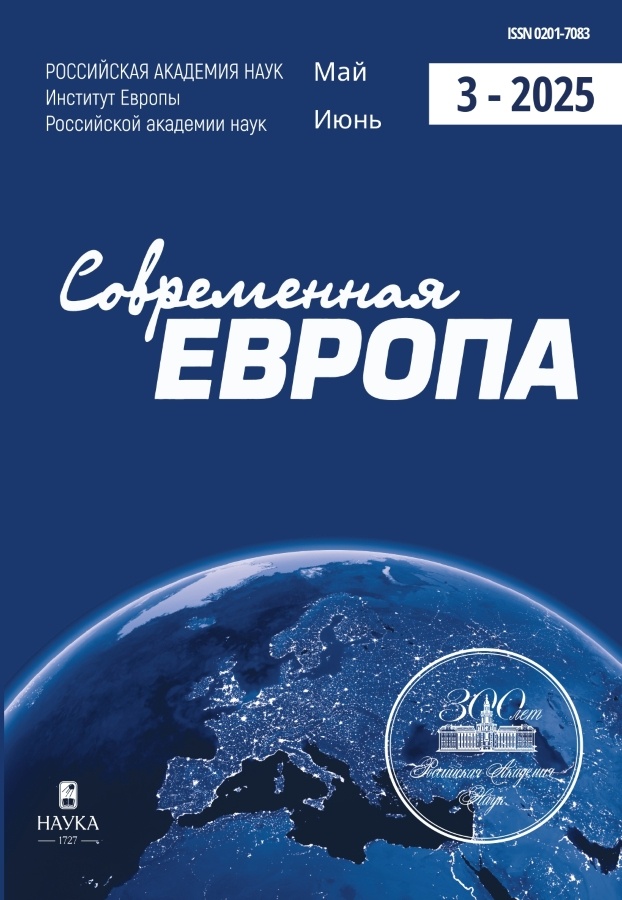European Sanctions Regimes Towards Russia: the Case of the Baltic-Scandinavian Macroregion
- Authors: Roginko S.A1
-
Affiliations:
- Institute of Europe RAS
- Issue: No 6 (127) (2024)
- Pages: 45-56
- Section: EUROPEAN PROCESS: COUNTRIES AND REGIONS
- URL: https://ruspoj.com/0201-7083/article/view/652295
- DOI: https://doi.org/10.31857/S0201708324060044
- ID: 652295
Cite item
Abstract
The article presents the results of a study of the evolution of the complex anti-Russian sanctions regime of the Western world in general and European sanctions regimes in particular. The analysis of unilateral anti-Russian sanctions measures initiated by the states of the BalticScandinavian macroregion in addition to the general sanctions regime of the European Union is carried out. Special attention is paid to the attempts of the countries of the Baltic-Scandinavian macroregion to play a leading role in the formation of new anti-Russian sanctions of the European Union, as well as measures addressed to countries of the Global South that do not share the goals of the EU's anti-Russian policy. Estimates of the impact of the anti-Russian sanctions regime of Western countries on the Russian economy are analysed. The result of the study is the periodisation of the stages of its formation in the period from 2014 to 2024, a comprehensive assessment of the initiatives of the Baltic-Scandinavian macroregion countries to shape new antiRussian sanctions of the European Union and the approaches of these countries targeted at the countries of the Global South.
About the authors
S. A Roginko
Institute of Europe RAS
Email: roginko@bk.ru
Candidate of Sciences (Economics), Head of Centre for Environment and Development Moscow, Russia
References
- Абанина И.Н., Середина М.И. (2023) Анализ динамики российского экспорта в условиях секторальных ограничений. Самоуправление. № 5(138). С. 16-19.
- Войников В.В. (2022) Антироссийские санкции (ограничительные меры) ЕС: соотношение с международным правом. Современная Европа. № 6. С. 5-17.
- Котов А.В. (2022) Актуальные вызовы для немецкого бизнеса на российском рынке. Современная Европа. № 3. С. 104-116. doi: 10.31857/S0201708322030081.
- Тимофеев И.Н. (2022a) Политика санкций Британии: институциональные механизмы и российское направление. Современная Европа. № 4. С. 22-36. doi: 10.31857/S0201708322040027.
- Тимофеев И.Н. (2022b) Политика санкций США на уровне исполнительной власти. Мировая экономика и международные отношения. Т. 66. № 3. С. 23-32. doi: 10.20542/0131-2227-2022-66-3-23-32
- Тимофеев И.Н., Морозов В.А., Тимофеева Ю.С. (2020) Санкции против России: взгляд в 2020 г. Доклад № 51/2020. НП РСМД, Москва. 96 с.
- Тимофеев И.Н. (2024) Вторичные санкции США на российском направлении: опыт эмпирического анализа. Сравнительная политика. № 15(1). С. 95-114. doi: 10.46272/2221-3279-2024-1-15-95-114
- Fillingham Z. (2024) Russian Economy: Short-term Resilience, Long-term Risk. Geopolitical Monitor. 13.08. URL: https://www.geopoliticalmonitor.com/russian-economy-short-term-resilience-long-term-risk/ (дата обращения: 10.11.2024).
- Giumelli F. (2016) The purposes of targeted sanctions. Targeted Sanctions: The Impacts and Effectiveness of United Nations Action. Ed. by T.J. Biersteker, S.E. Eckert, M. Tourinho. Cambridge University Press. P. 38-59. doi: 10.1017/CBO9781316460290.003
- Graceffo A. (2024) Yuan Shortages Latest Headache for Russian Economy. Geopolitical Monitor. 17.09. URL: https://www.geopoliticalmonitor.com/yuan-shortages-latest-headache-for-russian-economy/ (дата обращения: 10.11.2024).
- Gröschl J., Teti F. (2021) The Impact of Russia Sanctions on Companies. Ifo Schnell-dienst. No 74(1). P. 43-48.
Supplementary files











